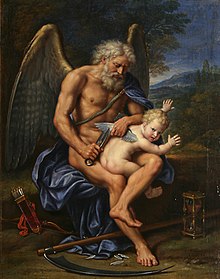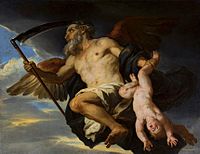Chronos
| Chronos | |
|---|---|
Personificationof time | |
 Time Clipping Cupid's Wings(1694), byPierre Mignard | |
| Symbol | zodiac wheel |
| Offspring | Aether,Phanes,Chaos |
Chronos(/ˈkroʊnɒs,-oʊs/;Ancient Greek:Χρόνος,romanized:Khronos,lit. 'Time',[kʰrónos]), also spelledChronus,is apersonificationof time inpre-Socratic philosophyand later literature.[1]
Chronos is frequently confused with, or perhaps consciously identified with, theTitan,Cronus,in antiquity, due to the similarity in names.[2]The identification became more widespread during the Renaissance, giving rise to the iconography ofFather Timewielding the harvesting scythe.[3]
Greco-Roman mosaics depicted Chronos as a man turning thezodiac wheel.[4]He is comparable to thedeity Aionas a symbol of cyclical time.[5]He is usually portrayed as an old callous man with a thick grey beard, personifying the destructive and stifling aspects of time.[6]
Name
[edit]
During antiquity, Chronos was occasionally interpreted asCronus.[7]According toPlutarch,the Greeks believed that Cronus was an allegorical name for Chronos.[8]
Mythology
[edit]In theOrphictradition, the unaging Chronos was "engendered" by "earth and water", and producedAether,Chaos,and an egg.[9]The egg produced the hermaphroditic godPhaneswho gave birth to the first generation of gods and is the ultimate creator of thecosmos.
Pherecydes of Syrosin his lostHeptamychos( "The seven recesses "), around 6th century BC, claimed that there were three eternal principles:Chronos,Zas(Zeus) andChthonie(thechthonic). The semen of Chronos was placed in the recesses of the Earth and produced the first generation of gods.[10]
See also
[edit]Notes
[edit]References
[edit]- Beekes, S. P.,Etymological Dictionary of Greek,2 vols. Leiden: Brill, 2009.
- Delaere, Mark,Unfolding Time: Studies in Temporality in Twentieth-century Music,Leuven University Press,2009.ISBN9789058677358.
- Kirk, G. S., J. E. Raven, M. Schofield.The Presocratic Philosophers: A Critical History with a Selection of Texts.Cambridge University Press;2 edition (February 24, 1984).ISBN0521274559.
- Liddell, Henry George,Robert Scott.A Greek-English Lexicon,revised and augmented throughout by Sir Henry Stuart Jones with the assistance of Roderick McKenzie,Clarendon PressOxford, 1940.Online version at the Perseus Digital Library.
- Levi, Doro,"Aion,"Hesperia13.4 (1944).
- Macey, Samuel L.,Encyclopedia of Time,Routledge.ISBN9781136508905.
- Meisner, Dwayne A.,Orphic Tradition and the Birth of the Gods,Oxford University Press,2018.ISBN978-0-190-66352-0.Online version at Oxford University Press.Google Books.
- Plutarch,Moralia, Volume V: Isis and Osiris. The E at Delphi. The Oracles at Delphi No Longer Given in Verse. The Obsolescence of Oracles.Translated by Frank Cole Babbitt.Loeb Classical LibraryNo. 306. Cambridge, MA:Harvard University Press,1936.ISBN978-0-674-99337-2.Online version at Harvard University Press.
- West, M. L.(1983),The Orphic Poems,Clarendon Press.ISBN978-0-19-814854-8.
